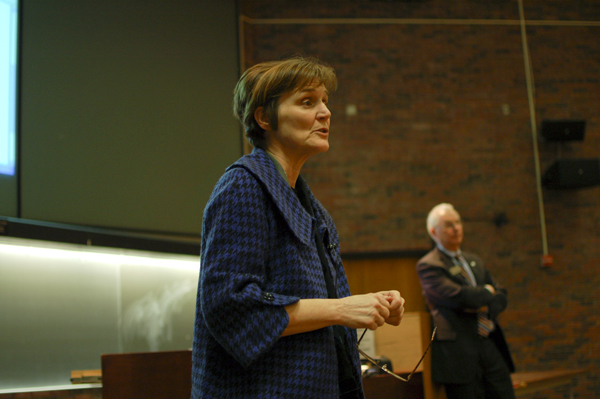

While campus administrators continue to review requests for a share of the new revenue generated by a tuition increase, one campus group has already been informed that their proposal will not be acted on: the United University Professions (UUP) union.
Vice President of Administration and Finance Jacqueline DiStefano said the UUP proposal to set aside 15 percent of the estimated $1.6 million in new revenue the college could be receiving in 2012-13 for increased adjunct pay will not be acted on because the union is still negotiating their contract.
DiStefano said the contract, which is negotiated with the state governor’s office of employee relations and the union, has not been finalized at this time. Since the current faculty contract makes no mention of salary for part-time faculty, DiStefano said college officials hope the union members will bring this issue to the negotiating table.
“We had hoped that these types of requests be brought to the people they are negotiating with in Albany,” she said. “We are not going to react to the requests until those negotiations were final.”
New Paltz UUP Chapter President Peter Brown said the budget request was made with the fact that campus officials have the ability to set a per-credit compensation rate for adjuncts in mind, however, and the union felt the availability of new revenue could provide a chance to close pay gaps between part-time and full-time faculty.
After the passage of Gov. Andrew Cuomo’s NY-SUNY 2020 plan and the statewide adoption of a five-year rational tuition plan across the system, the students at New Paltz and across the SUNY system experienced tuition increases beginning last fall. President Donald Christian said administrators are estimating that the college may have as much as $1.6 million in new revenue in the next fiscal year as a result.
UUP members proposed that 15 percent of those funds — approximately $240,000 — be set aside to increase pay for adjuncts. Brown said the union chose this number because it is the same percentage of funding earmarked for part-timers in the UUP’s Individual Development Awards, a joint state and union program.
“We thought since that number already exists in a joint program, it was a reasonable number,” he said. “It would come out to be a few extra hundred dollars for each adjunct per course. It’s not a huge amount of money, but it would be more than just a symbolic step towards closing the gap between adjunct salaries and everybody else.”
Brown said his research shows that adjuncts typically earn $12,000 annually for teaching two three-credit courses per semester at SUNY New Paltz, which he said requires them to seek other sources of income. He said the 235 part-timers employed by the college have not received a substantial salary increase in the past seven years, with compensation dropping 49 percent over the past four decades when adjusted for inflation.
The compensation of part-timers is an important issue to the union, Brown said because members feel the college should be concerned for the livelihood of the part-timers relied on to teach all types of courses across academic units at SUNY New Paltz. The union president said the fact that these faculty do not receive much pay could also discourage students from entering the education field, and that this should be corrected.
“If students see the result of hard work and getting good grades and getting a higher education degree is going to result in a dead-end job and near poverty wages, they are not going to go into the teaching profession,” he said. “I think we need to inspire students and get good people to go into this field, but if we pay people less than what the cleaners get paid, people will not want to go on to get a graduate degree and end up in a really low paying job.”
However, DiStefano said the rate offered to adjuncts are on par with colleges comparable to SUNY New Paltz at this time.
“We’ve looked at national and local benchmarks, including that for adjunct compensation at the nine other comprehensive colleges in the SUNY system,” she said. “Those data indicate that, comparatively, the per-credit hour/per-course rates that we offer are very competitive.”
DiStefano said union members should bring their research and opinions about compensation for part-timers to contract negotiations in Albany, as she feels this is a state and national issue in higher education.
Brown called the lack of mention of adjunct pay in the last contract a “glaring omission.”
“In the meantime, it’s up to individual adjuncts to negotiate their own salaries and they have no leverage whatsoever,” he said. “This all strengthens the argument that we need better provisions for adjuncts in our contract.”
Other requests for shares of the possible $1.6 million in new revenue are still being reviewed and summarized, DiStefano said. As of press time, she said administrators have received about 100 requests for funding from the revenue garnered from the tuition increases. The UUP request was the only one dealing with compensation, DiStefano said, while the rest were predominantly asking for funds to hire new faculty and student support services.
